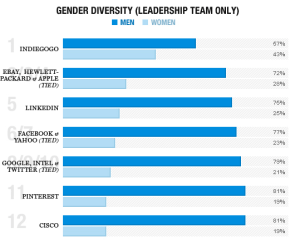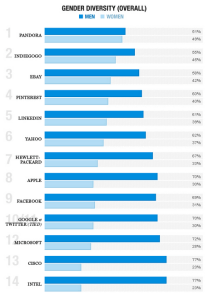Updated March 18, 2018
Was it a good idea to have women technology CEOs and coders pose in their underwear as a form of empowerment? Dear Kate, a company that sells “performance underwear for high performing women” has been dealing with this question since pics of its latest advertising campaign (2014) showing women techies in their undergarments were first released.
Some are not pleased with the campaign such as Elissa Shevinsky, CEO of the startup Glimpse Labs and author of the Business Insider article “That’s It—I’m Finished Defending Sexism in Tech.” She stated in Time Magazine that “[women] posing in [their] underwear undermines the message that [women] aim to be taken seriously as a technologist.” She added “This ad is like a parody,” and concluded. “I’m struggling to believe it’s real.” Natalie Matthews of Elle Magazine seems to disagree stating that “[t]here’s certainly no reason we should freak out over tech professionals embracing their feminine, sexual side…”
Dear Kate Founder and CEO Julie Sygiel came up with the campaign idea to help launch its Ada Collection, named after Ada Lovelace, the world’s first computer programmer. Sygiel sees these ads as part of its continuing efforts to promote real women, in this instance women in the tech industry.
Sygiel told Time “I think a lot of traditional lingerie photo shoots depict women as simply standing there looking sexy. They’re not always in a position of power and control” hence the ads showing the women coding in a tech/work environment. “In our photo shoots it’s important to portray women who are active and ambitious. They’re not just standing around waiting for things to happen.”
That may be true, but it doesn’t negate the fact that women have had a tough time in the technology industry, let alone reaching managerial echelons in the field. In the past few months several tech giants such as Google, Apple and Facebook finally released their employee demographics in response to grumblings regarding the tech industry’s lack of gender and racial diversity. As was expected the majority of tech employees are white and male (see side charts; other charts available at Fortune Magazine).
Combine the gender disparity with the ongoing misogyny in the field, women techies rightfully feel as if they are overlooked, underestimated and sometimes mistreated by their male counterparts in the industry.
But are these ads the right way to raise the issue of the lack of women in the tech industry?
When I first saw the ads the words ’empowerment,’ ‘awesome,’ or ‘sexist’ didn’t come to mind. I was mildly flummoxed about why these women were posing in their underwear with laptops. I was immediately reminded of commercials where I’ve seen young women talking about how they’re taking college classes online while in their pajamas. However, my bewilderment regarding the campaign turned into incredulity once I saw the other ‘Dear Kate’ images (where the women techies were still in their undies) with block quotes in which the women pontificated on the tech industry. This is where the campaign went off the unintentional deep end.

How can the quotes or thoughts of these women be taken seriously when juxtaposed with them in their undies? Sadly, it actually makes them seem vapid – like listening to a not-so-bright beauty queen discuss world hunger – which is exactly the opposite of the goal of the campaign. It’s as if the ads were trying to do a two-for-one-deal in showing that women should be proud of their bodies no matter what shape or size and that there are women breaking barriers in the tech industry.
But the problem regarding women techies hasn’t been about their actual bodies, in a general sense, but about the small number of women employed in the industry or in leadership positions. Also, why do women have to take off their clothes to show that they’re comfortable about their bodies as a form of empowerment? No one is expecting tech CEOs or leaders such as Apple’s Tim Wise, Facebook’s Mark Zuckerberg, Google’s Larry Page, Twitter’s Dick Costolo or Amazon’s Jeff Bezos to drop down to their skivvies to show the tech industry that they are a force to be acknowledged and reckoned with.
Nevertheless, Matthew has a problem with the need or requirement that women should remove their sexuality from their professional lives. She says that the “idea that if women want to eliminate gender biases in STEM fields, they must first separate their sexual selves from their “serious,” professional ones” is a “double standard” that she views as “backward.”
Adda Birner, Founder of Skillcrush, and one of the women featured in the Dear Kate campaign, said to Time “I speak to a lot of women who ask, ‘Is it possible to be a woman in technology and be happy and like your work and not be sexually harassed every day?’ And showing more images of the women who are working in tech and love it and are kicking ass and taking names is a really good thing.”
Maybe we’re over-thinking Dear Kate’s ‘Women In Tech’ Ada Collection campaign in that it’s not about empowerment, sexism or exploitation. Maybe it’s just about showing women who happen to work in technology, looking comfortable in their underwear while working.
Sygiel seems to think so, stating to Elle “I believe women should be taken seriously regardless of what we are wearing, and this should hold true for all professions.”
What Matthews, Birnir and Sygiel have said sounds nice, but the fact that we’re still primarily discussing seeing these women in their undergarments, and not their professional accomplishments in the tech industry is telling. It’s just another example that women still have a ways to go when it comes to optics not being the determining factor in how they are viewed by men and women, no matter Dear Kate’s female empowerment intentions. Then again, the company is in the business of selling underwear so they may have accomplished their goal, if not anyone else’s, involved in this campaign.
………………………………………………………………………………….
What do you think about the Dear Kate underwear campaign? Below is a one-question survey to voice your opinion.

Superb blog you have here but I was wondering if you knew of any forums that cover the same topics talked about in this article? I’d really like to be a part of online community where I can get feed-back from other knowledgeable people that share the same interest. If you have any suggestions, please let me know. Kudos!
LikeLike